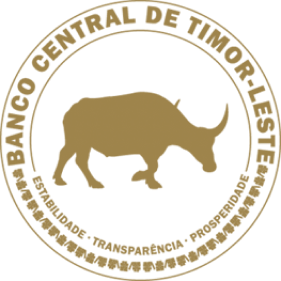The Central Bank is the monetary authority of Timor-Leste, and enjoys legal, operational, administrative, and financial autonomy. It aspires to the highest standards of Stability, Transparency and Prosperity. The Central Bank’s aims are expressed in its mission statement: "to be a central bank staffed by a professional team that strives to continuously improve the quality of our services to our stakeholders by maintaining a sustainable monetary system with low inflation; ensuring that payments systems are efficient and effective; promoting a safe and credible system of financial institutions; communicating and providing information; undertaking sound economic research and analysis; by developing the necessary organizational and technical capacities".
History
The Central Bank of Timor-Leste was formally established on 13 September 2011 under law no 5/2011 in accordance with Article 143 of the Constitution. Previously, central banking functions in Timor-Leste were carried out by predecessor organizations, the Banking & Payments Authority of East Timor (2001 to 2011) and the Central Payments Office (2000-2001) both of which were created by the United Nations Transitional Administration of East Timor (UNTAET) which administered the country from October 1999 to May 2002. The Central Payments Office held the government account (CFET) and made government payments, was responsible for bank licensing and supervision, and operated the Dili clearinghouse. The Banking & Payments Authority added to those functions the licensing and supervision of insurance companies, the publication of monetary and banking statistics and other economic information, the operational management of the Petroleum Fund, the issuance of centavos coins, and the operation of the Credit Registry Information System (CRIS) and the Large Value Transfer System (LVTS).
Vision
The BCTL’s vision is “to be a credible leader in preserving price stability to foster economic development in Timor-Leste.”Organization (organization chart)
The BCTL structure is comprised of four Departments: the Department of Financial System Supervision, the Department of Payments, the Department of Administration and the Department of Petroleum Fund; three independent Divisions: Accounting and Budget, Economics and Statistics, and Information Technology; and two specialized supporting Offices: the Legal Office and the Internal Audit Office.
Currency
The US dollar is the legal tender in Timor-Leste. All denominations of US banknotes and coins circulate in the country. The BCTL issues national coins as sub-units of the US dollar in denominations of 1, 5, 10, 25, 50, 100 and 200 cents.
Institutional Value
Transparency
We are a role model for society and for the institutions, our procedures and rules are clear and applied in a rigorous, universal and consistent way, both internally and externally.
Integrity
We exercise our business with honesty, high ethical and moral standards, respecting the confidentiality and legality in all actions and decisions involving our interests and resources.
Mobilization
We mobilize to provide the best service to the Timorese community, through the ability to consult, listen and learn so committed.
Ownership
We exhibit a sense of belonging and involvement, establishing as priority the objectives of the institution and showing availability to perform activities beyond the scope of our role.
Responsibility
We invest in expanding our technical and professional skills, deliver on the responsibilities that are assigned to us and that we proactively seek, through ongoing monitoring of the consequences of our decisions and actions.
Code of Conduct










